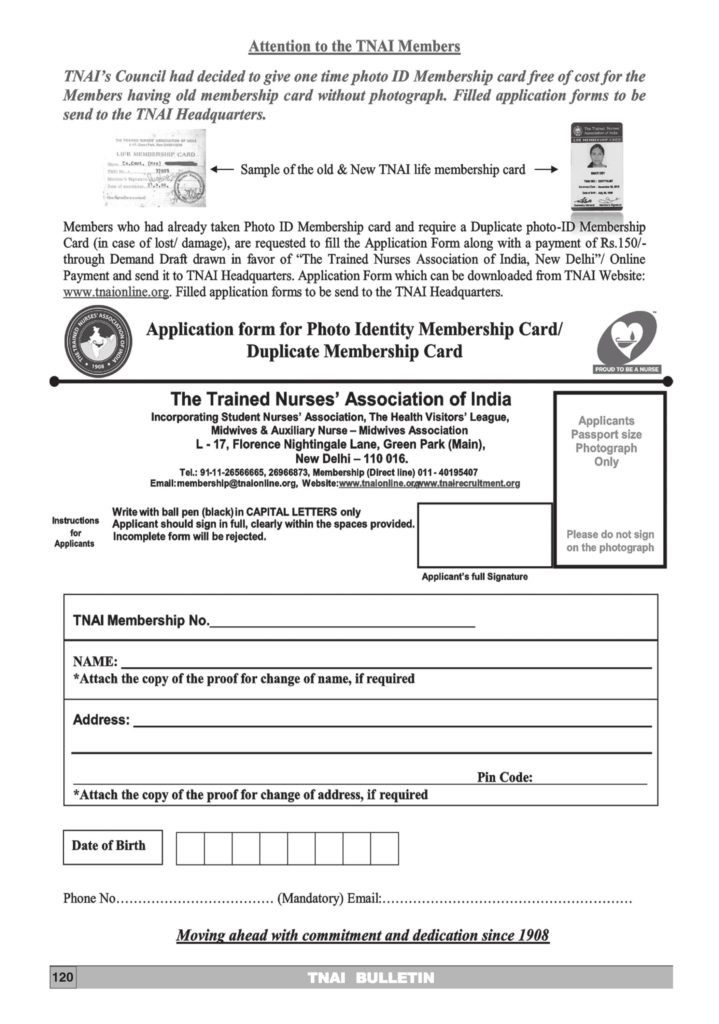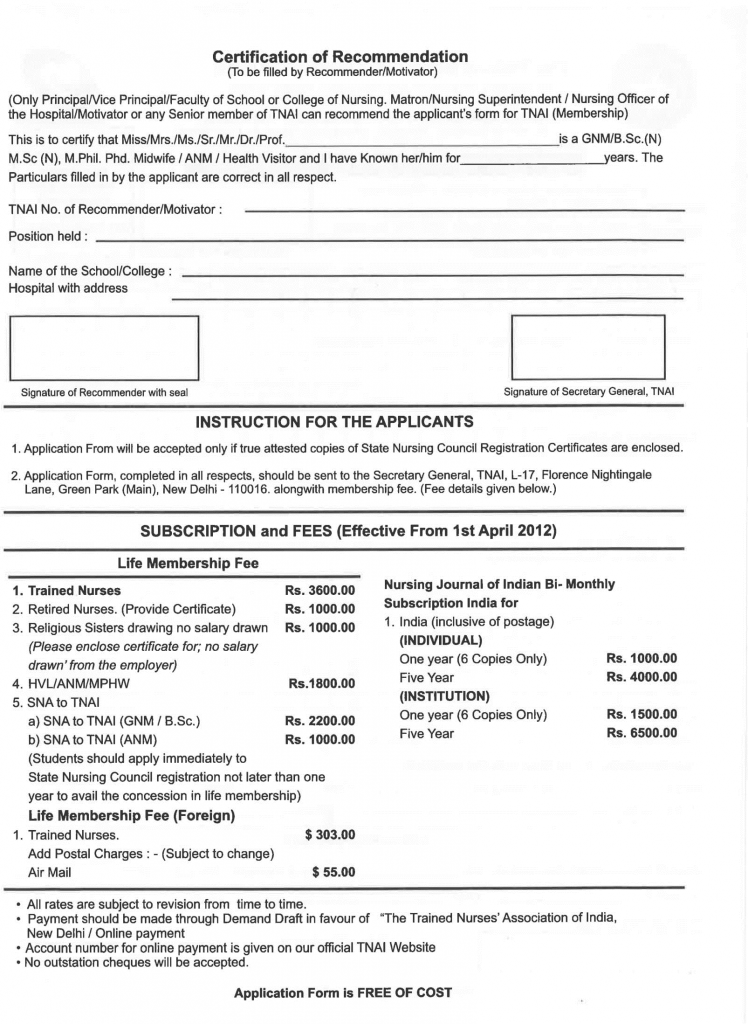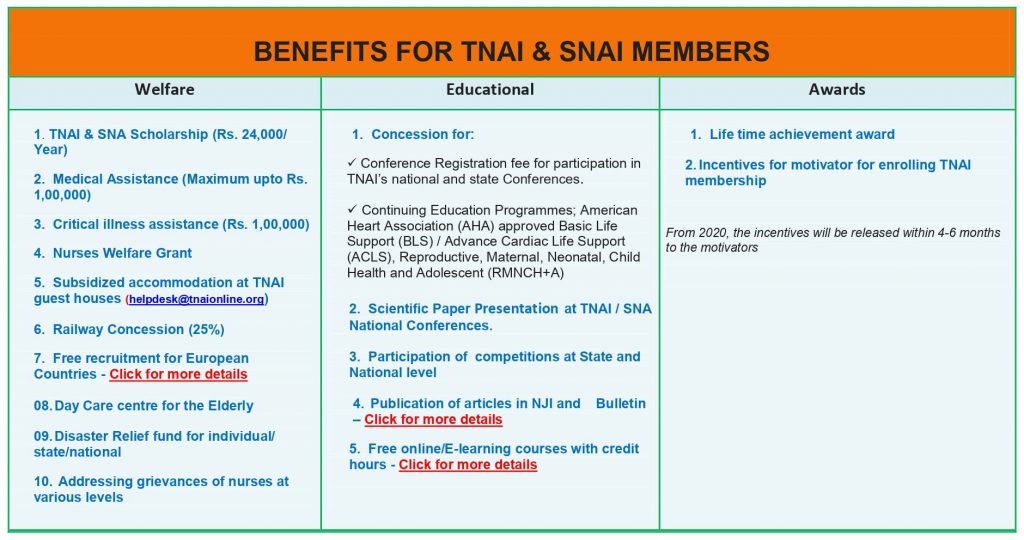THE TRAINED NURSES ASSOCIATION OF INDIA
Established 1908,
107 Glorious Years of Association Moving ahead with commitment and dedication.
Introduction:
The Trained Nurse’s Association of India (TNAI) is a national organization of nurse professionals at different levels. It was established in 1908 and was initially known as Association of Nursing Superintendents.
The Government of India has recognized TNAI as a service organization in 1950. A similar recognition by all the State Governments has been an asset to the promotion of its objectives.
Foundation stone for TNAI Headquarters Inaugurated by Smt. Indira Gandhi laid by Dr. S Radhakrishnan
Objectives
Upholding every way the
- Dignity and honor of the nursing profession,
- Promoting a sense of spirit de corps among all nurses,
- To advance professional, educational, economic and general welfare of nurses
Functions
- To enunciate standards of Nursing Education and implement these through appropriate channels.
- To establish standards and qualifications for nursing practice.
- To enunciate standards of Nursing Service and implement these through appropriate channels.
- To establish a code of ethical conduct for practitioners.
- To stimulate and promote research designed to enhance
- To stimulate and promote research designed to enhance the knowledge for evidence-based nursing practice.
- To promote legislation and to speak for Nurses in regard to legislative action.
- To promote and protect the economic welfare of Nurses.
- To provide professional counselling and placement service for Nurses.
- To provide for the continuing professional development of practitioners.
- To represent Nurses and serve as their spoke person with allied national and international organisations,governmental and other bodies and the public.
- To serve as the official representative of the Nurses of India
as a member of the International Council of Nurses. - To promote the general health and welfare of the public through the Association programmes, relationships and activities e.g. Disaster Management.
- To render care as per the changing needs of the society.
Membership
A life member is a person who is a registered Nurse and Midwife (equivalent of midwifery training in case of male nurse), trained from an institution recognized by the Indian Nursing Council/State Nursing Council and holds a certificate of training issued by a Nursing Registration Council or Board of Examinations recognized by the Indian Nursing Council.
Activities
The TNAI brings out a monthly journal, The Nursing Journal of India which was founded in 1910 as its official organ. This is the main link between the members of the Association, the Headquarters and State Branches on all important matters. The Association also brings out books on nursing practices and nursing education.
- Rapport with the government of India
- Government recognition as service association
- Issuance of the railway concession: Since 1991, Railway is granted concession to the TNAI members and the association was authorized to issue certificates to members for getting 25 % concessions in second classes.
- Affiliation with government committees and councils: TNAI is involved in all governmental endeavors in the field of nursing and given the opportunity to put across its points of view on all matters of consequence (Bhore committee, Central Council of Health).
- Affiliation with other organizations: TNAI is affiliated with all governmental and non governmental/ National and International organisations.
Collaboration in research activities:
Some of the major activities :
- HIV/AIDS project in collaboration with the American Nurses’ Association (1994).
- UNICEF Reproductive Child Health project on “Strengthening System support to ANMs and Health Supervisors, Females’ capabilities for implementing Safe Motherhood Practices in the Reproductive and Child Health Programme.” (2001).
- Feasibility study in collaboration with European Commission on improving health care for safe motherhood services of independent private practice by unemployed and under-employed ANMs in India (2002).
- TNAI/ Swedish International Development Corporation Agency/ Indian Institute of Management, Ahmadabad, project on improving midwifery and emergency obstetric services in India (2005)
- TNAI is in collaboration with The Association of Women Health, Obstetric and Neonatal Nurses (AWOHNN, US-based organization) are in the process of preparing the guidelines for new born skin care as per the Indian perspective.
Socio-Economic Welfare (SEW) Programmes
TNAI Being committed to provide socio-economic welfare to nurses in the country, a Socio-Economic Welfare (SEW) Committee was formed in 1963. TNAI conduct surveys to study the socio-economic welfare problems of nurses in India and recommended appropriate reforms and solutions. The TNAI Headquarters and the State Branches have been representing SEW problems of Nurses to the authorities concerned at different fora.



